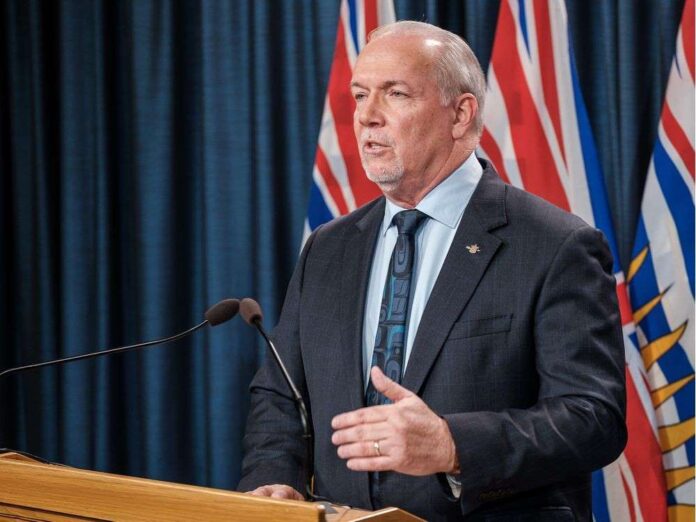VICTORIA — B.C.’s tourism minister says she’ll move as quickly as possible to help the sector, after a government-commissioned task force called on the province for more financial aid to mitigate the damage to the tourism industry caused by COVID-19.
Melanie Mark said she’ll rally cabinet colleagues like Economic Recovery Minister Ravi Kahlon to push for $50 million in immediate additional funding recommended by the task force, as well as the creation of a grant program for tourism-dependent businesses.
“That is a big call to action that Minister Kahlon and I have talked about and are going to be doing our advocacy,” she said. “We’re going to try and do as much as we can, as quickly as we can.”
B.C. Premier John Horgan was more vocal in his support of the task force, which he commissioned in September to come up with ideas to help a tourism sector that has been badly battered by the social-gathering and travel restrictions imposed to prevent against the spread of the virus.
Horgan was responding to concerns that some tourism businesses, having already spent almost a year of financial hardship, aren’t in a position to give refunds to customers who had booked trips before provincial health officer Dr. Bonnie Henry extended travel restrictions this week until Jan. 8.
“A lot of positive recommendations,” Horgan said Wednesday, describing the report. “We will be seeing the money flowing to the tourism sector, which I hope will allow them to provide refunds to people who will not be able to get the services that they paid for.”
The Tourism Task Force, chaired by Vancouver International Airport CEO Tamara Vrooman, quietly released its report to government Wednesday.
It had three financial requests:
• $50 million in new aid for tourism businesses, on top of $50 million previously announced by government in September.
• $5 million of the new funding earmarked toward Indigenous-run tourism businesses.
• A $95 million tourism grant program made up of new and previous funding.
In September, the tourism sector asked for a $680 million aid package. Instead, the premier provided $50 million and hired the task force to do a review.
“Stakeholders said that keeping their businesses open and their people safely employed and/or available when demand resumes were the priorities,” read the report. “$50 million is not enough to do this effectively, especially in light of the number of tourism operators, including Indigenous operators, who have not yet received funding because of eligibility criteria and the variability of the types of businesses and makeup of the tourism industry workforce.”
B.C.’s tourism sector accounts for more than $20 billion in revenue to the provincial economy and more than 160,000 jobs.
“The situation in the industry has dramatically worsened since the task force was convened in the fall,” read the report. “To ensure these businesses survive and the workforce remains connected to their jobs, there is a need for a larger emergency relief envelope.”
The report also called for $5 million to Indigenous Tourism B.C., to be used for Aboriginal tourism businesses, which currently account for 7,400 direct, full-time jobs.
The task force said the new and old funding could be packaged together into a $95 million “emergency fund” for tourism businesses, as an offshoot of government’s $300 million business recovery grant program.
“This is urgent, emergency funding that must go out now to preserve the maximum number of tourism businesses and jobs, keep the workforce connected to the industry and recognize the role of tourism operators as significant economic contributors in their regions,” read the report.
“It will bridge the gap until federal programs launch and expand eligibility to tourism businesses excluded from previous federal and provincial emergency funds. It will also bridge to the next provincial budget, where it is anticipated additional funds will be made available to the tourism industry.”
The grants can be used to extend benefits to workers to help keep them connected to their jobs, as well as pay for fixed costs such as utilities, property taxes and insurance premiums, recommended the task force.
“Employers need to indicate (check box) that they will bring back the workforce on an equitable basis given length of service, seniority and benefits, and will not reduce wages, vacation pay or other compensation if applying for a grant,” read the report.
In return, the group recommended government shouldn’t limit the funds based on whether the tourism company is owned outside of B.C. or has seasonal revenue fluctuations. To qualify, businesses would demonstrate their average income for the best of the previous five years to demonstrate viability — a key government requirement to obtain money.
The 35-page report recommended the B.C. government prioritize rapid testing for COVID-19 in the sector, and create a pilot program to establish “healthy travel corridors within defined bubbles” to boost public confidence once domestic and international travel is resumed.
Another recommendation, to establish a safety designation program that will let the public know which tourism businesses have undergone proper training, is something government can implement almost immediately, said Mark.
The province could also choose to provide financial relief by postponing or forgiving fixed costs such as Crown fees, permits, tenures taxes and commercial water fees for the sector until at least December 2022, read the report.
Once COVID-19 restrictions begin to be lifted, the report recommended the B.C. government should have an aggressive marketing plan to encourage travellers during what will be fierce global competition for trips and holidays. A “Welcome to B.C.” program should be created by spring 2021 and ready for whenever international borders are reopened.
Source: VANCOUVER SUN

